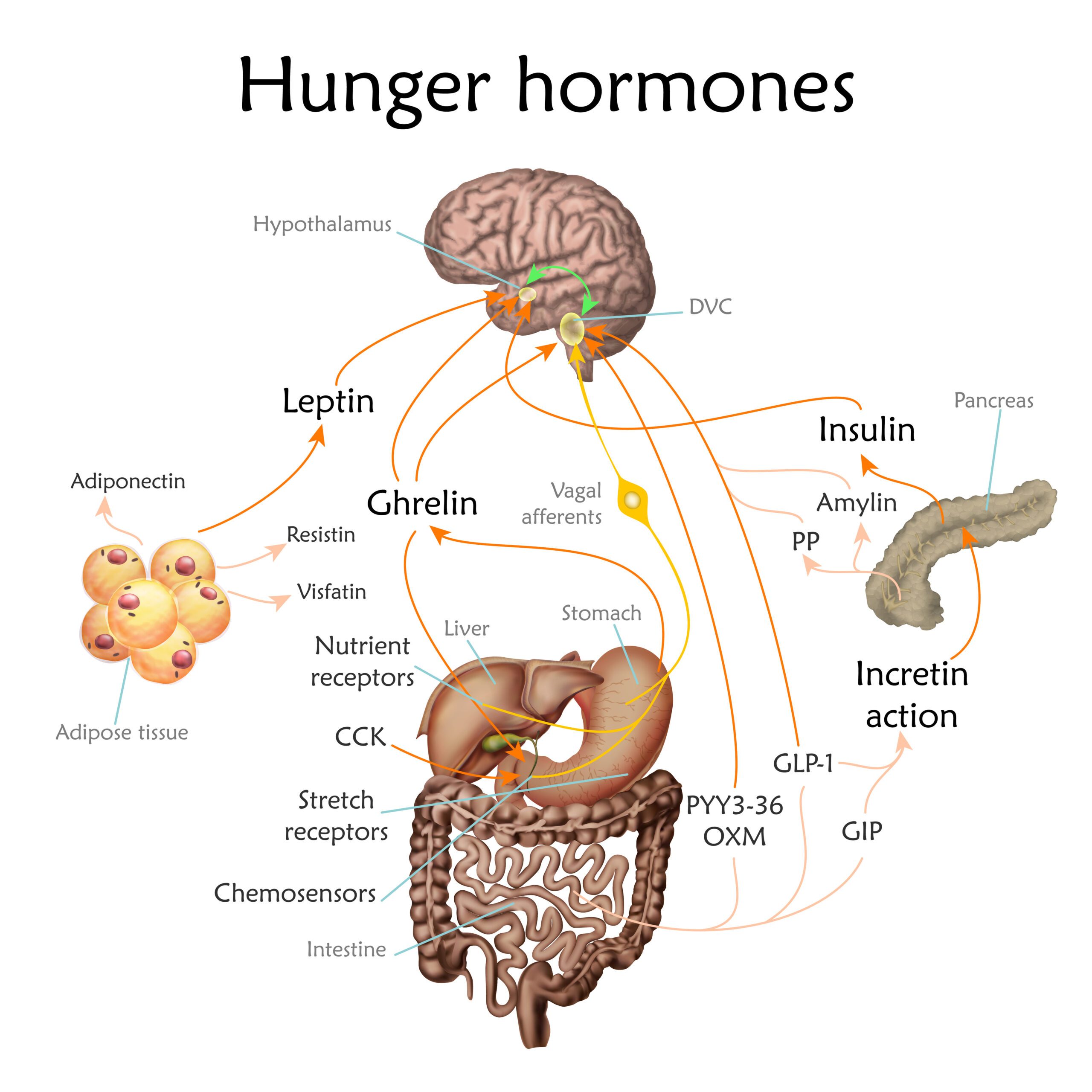
In the complex puzzle of weight loss, your genetic makeup plays a more significant role than you might realize.
Gone are the days of one-size-fits-all diet plans and exercise regimens.
With the advent of genetic testing and personalized medicine, we now understand that the secret to effective weight management may lie deep within our DNA.
This blog delves into the fascinating world of genetics and its profound impact on our metabolism, appetite, and fat storage, providing personalized insights that could revolutionize your approach to weight loss.

The journey to losing weight is deeply intertwined with our genetic blueprint.
Genetics can influence various aspects of weight management, from how quickly we burn calories to our tendencies to feel hungry or full.
Specific genes dictate our metabolic rate, the way we process foods, and even our predisposition to store body fat.
Your metabolic rate, the speed at which your body converts food into energy, isn’t solely determined by lifestyle factors; it’s also encoded in your DNA.
Genetic variations can affect how efficiently your body burns calories at rest and during exercise.
For instance, differences in the FTO gene, often referred to as the ‘obesity gene’, can influence your propensity to gain weight.
Ever wonder why some people feel fuller faster while others have larger appetites?
The answer could lie in your genes.
Hormones like leptin and ghrelin, which regulate appetite, are influenced by genetic factors.
Variations in these genes can affect how you experience hunger and satiety, ultimately influencing your dietary choices and portion sizes.
Understanding these genetic influences opens up a new realm of personalized weight loss strategies.
It shifts the focus from generic advice to more tailored approaches that align with your body’s inherent tendencies.

Diving deeper into the genetic influences on weight loss, we find that our metabolic rate – the engine driving our calorie burning – is intricately linked to our genetic code.
Not everyone’s engine runs at the same pace, and much of this variance can be attributed to genetic diversity.
Genetic factors play a crucial role in determining how our bodies process macronutrients – carbohydrates, proteins, and fats.
For example, some people have genetic variants that enable them to metabolize fats more efficiently, while others may process carbohydrates better.
This genetic predisposition significantly impacts how different diets work for different individuals.
One notable example is the APOA2 gene, which influences how the body responds to saturated fats.
Variations in this gene can determine whether a higher intake of these fats will lead to weight gain.
The thyroid gland, playing a vital role in regulating metabolism, is also subject to genetic influence.
Variations in genes related to thyroid function can impact your basal metabolic rate – the number of calories your body burns at rest.
This can explain why some individuals struggle with weight loss despite low-calorie diets.

Moving beyond metabolism, genetics also plays a pivotal role in how we experience hunger and fullness.
This aspect of weight management is often overlooked but is crucial for developing effective dietary strategies.
Genes affecting hormones like leptin and ghrelin significantly influence appetite control.
Leptin, known as the ‘satiety hormone’, signals the brain to stop eating.
Genetic variations can affect how sensitive your body is to leptin, impacting how quickly you feel full.
On the other hand, ghrelin, the ‘hunger hormone’, stimulates appetite.
Genetic differences in ghrelin production can explain why some people feel hungrier more often than others.
Understanding these genetic factors opens the door to personalized dietary strategies.
For instance, someone with a genetic predisposition to high ghrelin levels might benefit from a diet plan that includes more frequent, smaller meals to manage hunger more effectively.
By recognizing and adapting to these genetic influences, we can move towards a more personalized approach to weight loss that aligns with our body’s unique genetic makeup.

The puzzle of weight loss becomes even more intricate when we consider the role of genetics in fat storage.
It’s not just about how much fat we store, but also where we store it, and these patterns can be significantly influenced by our genetic makeup.
Certain genes are responsible for the distribution of fat in the body.
For instance, variations in the FTO gene, often associated with a higher risk of obesity, can affect fat distribution, leading to a propensity for storing fat in the abdominal area.
This type of fat, known as visceral fat, is linked to higher health risks, making its management crucial.
Understanding one’s genetic predisposition to fat storage can be a game-changer in addressing stubborn fat areas.
It can explain why some individuals struggle to lose belly fat or why others might find it hard to slim down their thighs, despite a well-managed diet and regular exercise.
Personalized weight loss plans that consider these genetic factors can be more effective.
They allow for targeted strategies, such as specific types of exercises or dietary adjustments, to address these stubborn areas.

With the advent of genetic testing, personalizing weight loss strategies has become more accessible than ever.
These tests can provide valuable insights into an individual’s unique genetic profile, allowing for a tailored approach to weight management.
Genetic testing can uncover specific genetic variants that impact metabolism, appetite, fat storage, and even exercise preferences.
This information can be a powerful tool in crafting a weight loss strategy that aligns with your genetic predisposition.
Armed with genetic insights, you can fine-tune your diet to what works best for your body.
For instance, if your genetic profile suggests a higher sensitivity to carbohydrates, a lower carb diet might be more effective.
Similarly, understanding your genetic makeup can guide you in choosing the type and intensity of exercise that is most beneficial for you.
Genetic information can also guide lifestyle modifications, such as sleep patterns and stress management techniques, to complement your physical efforts.
It offers a comprehensive approach to weight management that is unique to your genetic blueprint.
By integrating genetic insights into weight loss planning, individuals can embark on a more informed, effective, and personalized journey towards their health and fitness goals.

As we stand on the cusp of a new era in health and fitness, the future of genetic-based weight management holds immense promise.
Advances in genetic research are continually deepening our understanding of weight loss, obesity, and overall metabolic health, heralding a future where weight management strategies could be as unique as our DNA.
The field of genomics is rapidly evolving, bringing with it the potential for more detailed and nuanced insights into how our genes affect our weight.
Future advancements may include more comprehensive genetic testing that can analyze a wider array of genes related to weight management.
This could lead to even more personalized dietary and exercise recommendations, tailored to each individual’s unique genetic makeup.
However, it’s crucial to remember that genetics is just one piece of the weight management puzzle.
The best approach is a holistic one that combines genetic insights with lifestyle and environmental factors.
Nutrition, physical activity, mental health, sleep, and environmental influences all play integral roles in determining our overall health and ability to manage weight effectively.
Understanding our genetic makeup is a powerful tool in the journey toward effective weight loss and better health.
It provides a roadmap that can guide us in making more informed decisions about our diet, exercise, and lifestyle.
However, it’s important to remember that this is a personal journey, one that is unique to each individual.
In an era where personalized medicine is becoming more mainstream, considering a tailored approach to weight loss that aligns with your unique genetic profile is not just futuristic thinking – it’s a practical and effective way to achieve your health and fitness goals.
I encourage you to embrace the power of genetics in your weight loss journey, not as a definitive answer, but as a guide that works in harmony with your lifestyle, habits, and choices.
Together, they form the mosaic of a healthier, happier you.

A new study suggests that a widely used sugar substitute found in diet sodas, chewing gum, and low-sugar yogurt may elevate insulin levels. This could increase the long-term risk of heart disease. “Artificial sweeteners have infiltrated nearly all types of food, making it crucial to understand their long-term health effects,” said Yihai Cao, senior author […]

Diet Coke has long been a fan-favorite among soda lovers who want a fizzy, guilt-free alternative to traditional soft drinks. While its zero-calorie, zero-sugar label makes it seem like a healthier option, the reality is far more concerning. Despite its undeniable popularity, Diet Coke’s nutritional profile has raised red flags among health experts for years. […]

New study shows that embracing an anti-inflammatory, plant-forward diet can support cognitive function and help reduce the risk of dementia. What You Eat Shapes Your Brain The food you eat doesn’t just impact your body—it also affects your brain. Research suggests that eating an anti-inflammatory, plant-based diet can help improve memory, focus, and overall brain […]